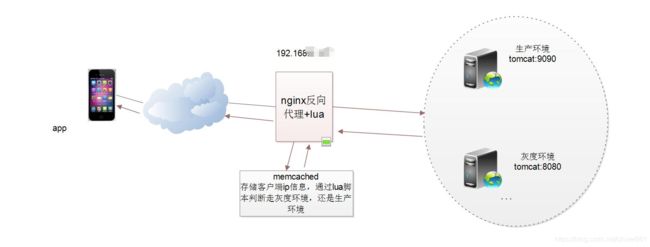Nginx+Lua 实现灰度发布详细步骤
一、概念
1.灰度发布是什么:
灰度发布(又名金丝雀发布)是指在黑与白之间,能够平滑过渡的一种发布方式。在其上可以进行A/B testing,即让一部分用户继续用产品特性A,一部分用户开始用产品特性B,如果用户对B没有什么反对意见,那么逐步扩大范围,把所有用户都迁移到B上面来。灰度发布可以保证整体系统的稳定,在初始灰度的时候就可以发现、调整问题,以保证其影响度。
灰度期:灰度发布开始到结束期间的这一段时间,称为灰度期。
2.这里用于WEB系统新代码的测试发布,让一部分(IP)用户访问新版本,一部分用户仍然访问正常版本,其原理如下图:
二、环境准备
模块目录全部放在/opt/下
官网:http://luajit.org/download.html
```html
#安装LuaJIT
wget -P /opt/ http://down.i4t.com/LuaJIT-2.0.5.tar.gz
tar xf LuaJIT-2.0.5.tar.gz
cd LuaJIT-2.0.5
make && make install
echo "export LUAJIT_LIB=/usr/local/lib" >>/etc/profile
echo "export LUAJIT_INC=/usr/local/include/luajit-2.0" >>/etc/profile
source /etc/profile
注:ngx_devel_kit和lua-nginx-module都是lua必须要的模块
#下载ngx_devel_kit模块
wget -P /opt/ http://down.i4t.com/ngx_devel_kit-0.3.0.tar.gz
tar xf ngx_devel_kit-0.3.0.tar.gz
#下载lua-nginx-module模块
wget -P /opt/ http://down.i4t.com/lua-nginx-module-0.10.13.tar.gz
tar xf lua-nginx-module-0.10.13.tar.gz
还需要安装redis2-nginx-module模块
redis2-nginx-module 是一个支持 Redis 2.0 协议的 Nginx upstream 模块,它可以让 Nginx 以非阻塞方式直接防问远方的 Redis 服务,同时支持 TCP 协议和 Unix Domain Socket 模式,并且可以启用强大的 Redis 连接池功能
wget -P /opt/ http://down.i4t.com/redis2-nginx-module-0.15.tar.gz
tar xf redis2-nginx-module-0.15.tar.gz
接下来安装Nginx,版本采用目前稳定版1.14
#下载nginx
wget -P /opt/ http://down.i4t.com/nginx-1.14.2 tar.gz
tar xf nginx-1.14.2 tar.gz
现在进行编译安装nginx
1.安装依赖包
yum install -y gcc glibc gcc-c++ prce-devel openssl-devel pcre-devel lua-devel libxml2 libxml2-devel libxslt-devel perl-ExtUtils-Embed GeoIP GeoIP-devel GeoIP-data zlib zlib-devel openssl pcre pcre-devel gcc g++ gcc-c++ gd-devel
2.创建用户
useradd -s /sbin/nologin nginx -M
3.编译安装nginx
cd /opt/nginx-1.14.2
./configure --prefix=/usr/local/nginx-1.14.2 \
--user=nginx --group=nginx --with-http_ssl_module \
--with-http_stub_status_module \
--add-module=/opt/lua-nginx-module-0.10.13 \
--add-module=/opt/ngx_devel_kit-0.3.0 \
--add-module=/opt/redis2-nginx-module-0.15
#必须按我的版本来,否则会出现问题
make && make install
#设置软连
ln -s /usr/local/nginx-1.14.2 /usr/local/nginx
#设置模块,否则nginx -t报错
ln -s /usr/local/lib/libluajit-5.1.so.2 /lib64/libluajit-5.1.so.2
错误提示如下:
/usr/local/nginx/sbin/nginx -t
/usr/local/nginx/sbin/nginx: error while loading shared libraries: libluajit-5.1.so.2: cannot open shared object file: No such file or directory
三、Nginx配置Lua
在nginx编译之后,我们需要先检查一下lua是否安装成功
1.首先检查nginx服务是否正常
lsof -i :80
ps -ef | grep nginx
cur
cur -I 127.0.0.1
2.验证lua模块是否成功
location /test {
default_type 'text/plain';
content_by_lua 'ngx.say("test")';
}
3.reload nginx检查是否正常
[root@abcdocker ~]# vim /usr/local/nginx/conf/nginx.conf
[root@abcdocker ~]# /usr/local/nginx/sbin/nginx -t
nginx: the configuration file /usr/local/nginx-1.14.2/conf/nginx.conf syntax is ok
nginx: configuration file /usr/local/nginx-1.14.2/conf/nginx.conf test is successful
[root@abcdocker ~]# /usr/local/nginx/sbin/nginx -s reload
[root@abcdocker ~]# curl 127.0.0.1/test
test
当访问/test时返回值也为test代表没有问题,也可以在浏览器访问
四、安装redis
#yum安装
yum install epel-release
yum repolist
yum install redis -y
#修改redis ip
sed -i 's/127.0.0.1/0.0.0.0/g' /etc/redis.conf
#启动服务
service redis start
[root@abcdocker logs]# ps -ef|grep redis
redis 24334 1 1 05:04 ? 00:00:00 /usr/bin/redis-server 10.4.82.138:6379
root 24349 14935 0 05:04 pts/0 00:00:00 grep --color=auto redis
#检查Telnet是否正常
[root@abcdocker logs]# telnet 10.4.82.138 6379
Trying 10.4.82.138...
Connected to 10.4.82.138.
Escape character is '^]'.
五、修改Nginx配置文件,引用lua脚本
1.下载加载lua库的redis脚本文件
cd /opt
git clone https://github.com/openresty/lua-resty-redis.git
cd lua-resty-redis/
make && make install
#当make完毕之后会生成路径,复制相关路径就可以
ll /usr/local/lib/lua/resty/redis.lua
2.创建lua脚本
#创建lua目录
mkdir /usr/local/nginx/conf/lua
#脚本内容如下
cat > /usr/local/nginx/conf/lua/abcdocker.lua <<EOF
local local_ip = ngx.req.get_headers()["X-Real-IP"];
if local_ip == nil then
local_ip = ngx.req.get_headers()["x_forwarded_for"];
end
if local_ip == nil then
local_ip = ngx.var.remote_addr;
end
local function close_redis(redis_instance)
if not redis_instance then
return
end
local ok,err = redis_instance:close();
if not ok then
ngx.say("close redis error : ",err);
end
end
local redis = require("resty.redis");
--local redis = require "redis"
-- 创建一个redis对象实例。在失败,返回nil和描述错误的字符串的情况下
local redis_instance = redis:new();
--设置后续操作的超时(以毫秒为单位)保护,包括connect方法
redis_instance:set_timeout(1000)
--建立连接
local ip = '10.4.82.138'
local port = 6379
--尝试连接到redis服务器正在侦听的远程主机和端口
local ok,err = redis_instance:connect(ip,port)
if not ok then
ngx.say("connect redis error : ",err)
return close_redis(redis_instance);
end
--Redis身份验证
--local auth,err = redis_instance:auth("");
--if not auth then
-- ngx.say("failed to authenticate : ",err)
--end
--调用API进行处理
--local resp,err = redis_instance:set("msg","hello world")
--if not resp then
-- ngx.say("set msg error : ",err)
-- return close_redis(redis_instance)
--end
--调用API获取数据
local resp, err = redis_instance:get(local_ip)
if not resp then
ngx.say("get msg error : ", err)
return close_redis(redis_instance)
end
--得到的数据为空处理
if resp == nil then
ngx.exec("@prod1") --比如默认值(对应Nginx local下面的配置)
end
--ngx.say("msg:",resp)
if resp == "0" then
ngx.exec("@prod1");
--return
--close_redis(redis_instance)
else
ngx.exec("@prod2");
-- return close_redis(redis_instance)
end
close_redis(redis_instance)
EOF
#这里匹配了2套环境,prod01 && prod02 在nginx.conf会体现出来
#注意修改redis地址
2.修改nginx.conf,引用redis.lua脚本
cat /usr/local/nginx/conf/nginx.conf
user nginx;
worker_processes 1;
events {
worker_connections 1024;
}
http {
include mime.types;
default_type application/octet-stream;
sendfile on;
keepalive_timeout 65;
lua_package_path "/usr/local/lib/lua/resty/redis.lua";
lua_shared_dict ip_blacklist 1m;
server {
listen 80;
server_name localhost;
location / {
lua_code_cache off;
proxy_set_header Host $host;
proxy_set_header X-Real-IP $remote_addr;
proxy_set_header X-Forwarded-For $proxy_add_x_forwarded_for;
content_by_lua_file "/usr/local/nginx/conf/lua/script/redis.lua";
}
location @prod1 {
proxy_pass http://10.4.82.140:8080;
}
location @prod2 {
proxy_pass http://10.4.82.138:8080;
}
}
}
#在http标签添加lua变量及i4t.conf
#lua_package_path "/usr/local/lib/lua/resty/redis.lua";#lua脚本路径
#lua_shared_dict ip_blacklist 1m; 共享内存区域始终由当前nginx服务器实例中的所有nginx工作进程共享
#content_by_lua_file 自定义lua脚本路径
#lua_code_cache nginx配置中将lua_code_cache配置成on/off来控制是否关闭lua 的cache缓存,如果设置为off.则每次修改lua脚本都会重新加载新的lua代码,从而实现快速调试响应。同时状态为off时启动或重启nginx都会提示:nginx: [alert] lua_code_cache is off; this will hurt performance in /path/to/nginx.conf。因为这会影响nginx性能表现。一般开发调试的时候使用off, 线上运行时设置为on。
#localtion @prod1代表环境1
#localtion @prod2代表环境2
启动
$ /usr/local/nginx/sbin/nginx -t
nginx: [alert] lua_code_cache is off; this will hurt performance in /usr/local/nginx-1.14.2/conf/nginx.conf:22
nginx: the configuration file /usr/local/nginx-1.14.2/conf/nginx.conf syntax is ok
nginx: configuration file /usr/local/nginx-1.14.2/conf/nginx.conf test is successful
#这里的警告可以忽略,是由于lua_code_cache为off影响的
接下来就是部署2台tomcat
10.4.82.138 8080
10.4.82.140 8080
当默认访问的时候,不修改redis参数,不加任何变量访问的是prod2环境
默认访问如下图
进入到redis里面,让这个ip访问成prod1环境
这里的脚本逻辑解释如下
redis Key 为0 访问Pord1
redis Key 为空 访问Pord2
redis Key 为1 访问Pord2
image_1dcgu3tqq1mej1ieho181fp34vc35.png-124.7kB
修改过nginx之后再次访问10.4.82.138 项目就变为tomcat代码了





